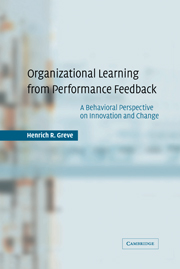3 - Model
Published online by Cambridge University Press: 03 December 2009
Summary
A central idea of performance feedback theory is that decision makers use an aspiration level to evaluate organizational performance along an organizational goal dimension. An aspiration level has been defined as “the level of future performance in a familiar task which an individual … explicitly undertakes to reach” (Frank 1935), as a “reference point that is psychologically neutral” (Kameda and Davis 1990: 56) or as “the smallest outcome that would be deemed satisfactory by the decision maker” (Schneider 1992: 1053). It is a result of a boundedly rational decision maker trying to simplify evaluation by transforming a continuous measure of performance into a discrete measure of success or failure (March 1988; March and Simon 1958). The aspiration level is the borderline between perceived success and failure and the starting point of doubt and conflict in decision making (Lopes 1987; Schneider 1992).
Aspiration levels are the center of the theory. Before the aspiration level can take effect, some cognitive process must form it. Once the aspiration level is set, comparisons with performance guide organizational change processes. Here I develop the theory in the same order, starting with how aspiration levels are made and continuing with how they affect the organization. The origins of aspiration levels include learning from the performance of oneself, learning from the performance of others, or direct learning of the aspirations of others (Lewin et al. 1944).
- Type
- Chapter
- Information
- Organizational Learning from Performance FeedbackA Behavioral Perspective on Innovation and Change, pp. 39 - 75Publisher: Cambridge University PressPrint publication year: 2003



